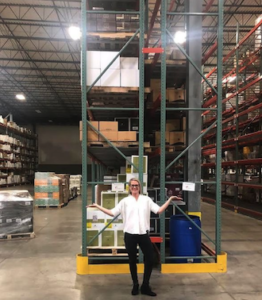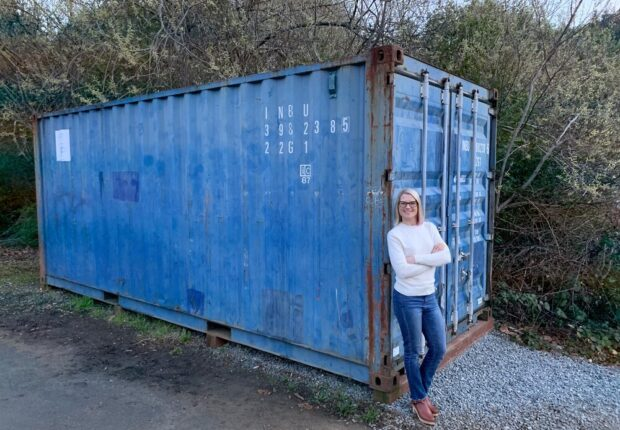Entrepreneurial initiatives such as that of Alexi Cashen reflect a new trend that moves the framework of the now obsolete American sales system based on the three levels of production, import and distribution, called the three-tier system, which often slows down exchanges and makes the sale of wine and spirits at a very high price to the consumer.
The import-export relations between Europe and the United States have always been one of the pillars of the markets of both countries. Strained during the Trump administration, but constantly renewed every year, even during the toughest times of the pandemic, trade relations between the US and Europe remain solid and perhaps, with the new Biden administration, even more valued than before.
For Italy, the sale of food and wine products in America has always been one of the driving markets of the economy if we consider that about 32% of Italian wine is exported to America every year and represents only a small slice of the production of local food and wine goods.
Meanwhile, the market for Italian spirits is growing and their consumption at home and abroad is also growing. It is for this reason that new solutions are born to facilitate the exchange process between Italy and the United States, which alone buy about 35 billion euros in Italian goods each year, 41 billion if we consider the value in dollars.
To find out more, we interviewed Alexi Cashen, host of her podcast on Wine & Spirits and a female entrepreneur who has launched one of the most innovative wine and spirits import services in the American market.

Alexi Cashen is an entrepreneur from San Francisco who, with her company Elenteny Imports, has created a new format for importing wine and spirits in America that follows the customer from the shipping phase of the products to their storage and in some cases even up to distribution in order to make the export process faster, personalized and organic.
Alexi, I want to ask you a few questions about the import-export of Italian wines to America but perhaps first you can tell us more about yourself and your business, the products you import to the US and your “second life” as a podcaster. Do you think these two parts of your life are well integrated with each other or do you prefer to keep them separate?
“Thanks Gaia, Elenteny Imports is a great business that started 10 years ago and has simply grown over the years. We give a very valuable service to the different brands, wineries and importers who choose us and it is very nice to remain faithful to our mission. In fact, from the very beginning, we wanted to set up a business that could evolve over time and become very competitive in the alcohol import-export sector. When we started, there was still little competition, about 5 companies were providing services similar to ours, but we knew that we could grow and it really seemed like a unique business opportunity to be able to compete in a small slice that would then expand. I have been CEO of this business since its inception and I really appreciate the way our company has grown over the years, it is an advantage to have such a broad view of the industry we work in. In fact, when I started my podcast I had so many stories collected over the years and I also had experience in the field so I decided to share these stories through a podcast. So I would say that these two parts of my life are really very integrated, it’s an exciting project and it was also a lot of fun for me because I started it in 2020. It was a salvation to have this creative project to focus on during the pandemic. It gave the possibility to look forward to something that can grow and something new to build, it was a nice distraction. “
Entrepreneurial initiatives such as that of Alexi Cashen reflect a new trend that moves the framework of the now obsolete American sales system based on the three levels of import, distribution and retail trade called three-tier system, which often slows down trade and makes the sale of wine and spirits not very agile and comes at a high price to the consumer. In fact, in the United States it is not taken for granted that one can rely on a single player in the area that deals with shipping logistics, customs clearance and the administrative regulatory part, storage, up to the conveyance of the product to wholesalers and retailers.
“In our circuit we give greater flexibility while other traditional importers make it really complicated for the manufacturer to control their brand, many import-export services make all decisions in terms of the market while we simply provide a basic platform and the customer, if he wants, he can insert his own distributor and is free to make choices in terms of management of his own resources.” Alexi adds.

We hear that your podcast is especially dedicated to women in the wine and spirits industry. Sometimes it is difficult to be a woman who works in this sector and I know it well, but this role really seems to fit you, I guess it’s a real passion for you too. Can I ask you when this passion was born and how did it evolve?
“Good question! In my podcast I look for and find many different women who work in the wine industry but I don’t give space only to them on the show, although I must say that I have a real passion for women in general in terms of entrepreneurship and business. For example, statistics in the US say that more than 50% of American businesses are run by women but less than 1% exceeds one million in terms of economic value. This to me is a really big imbalance, I am obviously referring to the fact that most of the entrepreneurs in America are women but the majority of the rewards and profits are given to men, not to mention the economic imbalance that I have really struggled to overcome in quality as a leading woman of myself. I am very attached to this topic in general, I had the great pleasure of interviewing Rania Zayyat, one of the amazing women in wine, on my podcast, and she is really focused on women who work in this sector. It was sometimes problematic for us women, due to our gender, to work in the purely male wine and spirits industry, there has also been a strong me too movement in the sector.
These are things we all have to pay attention to and I really appreciate being a strong voice in this narrative. “
What are the main countries with which your company works? And then, focusing on Italy, how is trade between Italy and the United States going; how is the market responding to this new pandemic wave? We now know how it went last year during the first wave but it is difficult to predict what will happen in the next months, can you tell us what ideas you have?
“In Europe we import mostly from Italy, France, Germany, Spain, Austria, Portugal but also from Chile, Argentina, New Zealand, Australia … sometimes we have also had containers from Georgia. Our relationship with Italy has been solid from the beginning, the very first customers we worked with about 10 years ago were Italian wineries, Paitin in Piedmont and also Felsina in Tuscany, they were really the first two wineries we collaborated with and our relationship with Italy grew from there. The pandemic is obviously putting everyone to the test and there have been major changes not only in relations with Italy but everywhere with cuts from all sides. It was all caused by the pandemic but I would like to say that my customers, despite everything, are growing, they are 20-30% higher than in 2019 which is an encouraging figure. I would also like to emphasize, however, that Italian wines have not suffered from the duties imposed by the Trump administration, this has even helped them to rise in the American market because many importers now focus on these products to which the new duties have not been applied “.
She adds “In the United States, the sale of alcoholic products to restaurants represents about 50% of revenues. People are drinking, they are drinking at home and there is still a strong private sale. The entire alcohol market has not collapsed or disappeared and I am grateful for that, but it was really very difficult to get out of it for businesses related to restaurants and the hospitality sector. Still, the other major difficulties we face are the duties on wine. After Trump raised tariffs to 25% on imported wine from many of the European countries, there was a gigantic impact on my business which is down by about 30% in volume. Some of this is potentially due to the pandemic but before the pandemic, when these tariffs went up in October 2019, the business plummeted 30% immediately so it’s hard to say how much this recession really is directly linked to the pandemic and how much tariffs. “.

Since you introduced the speech, tell us more about the difficulties in importing European alcohol products during the Trump administration, but also about any concessions, if there were any. Do you think that with the new Biden administration everything will become easier and that trade relations with Europe will be facilitated?
“The previous administration tested us for a great many reasons, some good and some bad. The first thing the Trump administration implemented was the Craft Beverage Modernization Act or CBMA. It was an act that allowed importers from America to have a reduction in taxes on the contributions we pay. This was a good thing, the reduction in these taxes, but the process of actually obtaining this reduction was much more complex. For example, my company had to make huge investments in other resources simply to get access to this reduction. So yes, it was a good thing, but it was a convoluted and a little bit “unfortunate” process. I hope the Biden administration will continue with the CBMA but I hope they can improve the process of obtaining it. As for the tariffs, these were absolutely terrifying. My company in particular has paid over $6 million in wine duties to the US government, this figure for a small business can directly end. The worst of these tariffs in America is that, as you already know, there is a “three-tier system”. Due to the constraints of this system, legally, the only people who can buy and resell wine in America are American companies and there are three of these categories: importers, distributors and retailers. Therefore, duties are not only a problem for European companies which, let’s face it, if they do not sell in America they can sell in China or in other countries of the world, these duties are a big problem also and above all for American companies. I am very active on this particular issue and I have collaborated with the US WTA (Wine Trade Alliance), an organization born this summer, we are working hard to eradicate duties on European wines. Especially now during a pandemic, tariffs only make these times more difficult, so we need to change and make sure that the Biden administration will pay attention to this issue as soon as possible “.
Translated from original article By Gaia Mariani here

